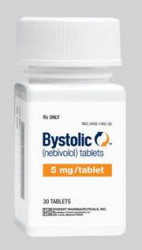Bystolic (nebivolol) Coupons, Discounts & Cost
Bystolic (nebivolol) is a cardioselective beta-blocker with mild vasodilator action. One way to save money on the Bystolic (nebivolol) retail cost regardless of income and insurance status is to use Bystolic (nebivolol) coupons or discount cards from RXCoupons. Use this Bystolic (nebivolol) coupon at this online pharmacy and receive up to 75% off the sale price.
Bystolic (nebivolol) pharmacological action
Bystolic (nebivolol) is a cardioselective beta-blocker with mild vasodilator action. The drug is used to treat pathological conditions such as high blood pressure (hypertension), heart failure, ischemia.
Nebivolol slows heart rate and reduces blood pressure. It has antianginal effect in patients who suffer from ischemia.
The drug should be taken regularly for 15-30 days to obtain a stable hypotensive effect.
Bystolic (nebivolol) indications for use
Bystolic (nebivolol) is prescribed to treat pathological processes such as chronic heart failure and high blood pressure. It is also used for the prevention of heart failure.
When you should avoid Bystolic (nebivolol)
Bystolic direct contraindications: - High level of sensitivity to any substance of the drug; - Liver failure, liver disease (severe form); - Acute heart failure, cardiogenic shock; - Acute decompensated heart failure; - Sick sinus syndrome; - Bronchospasm and asthma; - Untreated pheochromocytoma; - Metabolic acidosis.
Bystolic (nebivolol) can cause neonatal bradycardia, respiratory failure, as well as hypoglycemia. That is why this drug is contraindicated during pregnancy.
Patients with serious pathology associated with liver or kidneys should not take this drug.
Children under the age of 18 should not take this drug.
Elderly patients (over 65 years) should be closely monitored for signs of kidney damage (once every 3-4 months).
Patients should carefully read the instructions (indications and contraindications, dosage, side effects, etc.).
Bystolic (nebivolol) dosage
Adults take 2.5 mg to 5 mg per day (usually in the morning). If necessary, the dosage is increased to 10 mg.
Patients older than 65 years of age should start with a dose of 2.5 mg per day.
Side effects of Bystolic (nebivolol)
Central nervous system: headache, dizziness, fatigue, depression, drowsiness or insomnia, fainting or hallucinations. Digestive system: nausea and vomiting, bowel syndrome, dry mouth. Cardiovascular system: edema, shortness of breath, cardialgia. Skin disorders: rash and itching, allergic reactions, psoriasis, angioneurotic edema. Allergic reactions: bronchospasm, dryness of the eyes.
Bystolic is not contraindicated in obese patients or those with type 2 diabetes. It has no effect on metabolic parameters. Bystolic has no effect on the results of blood tests for glucose, cholesterol and triglycerides.
How Bystolic (nebivolol) interacts with other medications?
Nitroglycerin and drugs that lower blood pressure may cause a sharp decrease in blood pressure.
Particular caution should be exercised when taking drugs used for anesthesia (risk of hypotension).
Barbiturates and antidepressants could enhance the effects of Bystolic.
Serotonin reuptake inhibitors increase the risk of bradycardia.
It is not allowed to combine verapamil and Bystolic.
Bystolic (nebivolol) overdose
The following symptoms may occur in case of overdose: bronchospasm, congestive heart failure, high blood pressure.
Bystolic (nebivolol) special warnings
Bystolic should be used with great caution in patients who are diagnosed with the following diseases: renal failure, diabetes, psoriasis, hyperthyroidism, first-degree heart block, Prinzmetal angina.
Termination of drug therapy must be carried out gradually (gradually reduce the dose of the drug for 8-10 days).
It should be noted that smoking is associated with reduced beta blocker effectiveness (smoking makes Bystolic less effective).
If you are planning surgery, you must tell the anesthetist that you are using Bystolic.
Patients diagnosed with diabetes should systematically control blood glucose levels.
Bystolic may cause dizziness and fatigue. Therefore, it is necessary to avoid driving and activities which are potentially dangerous.

